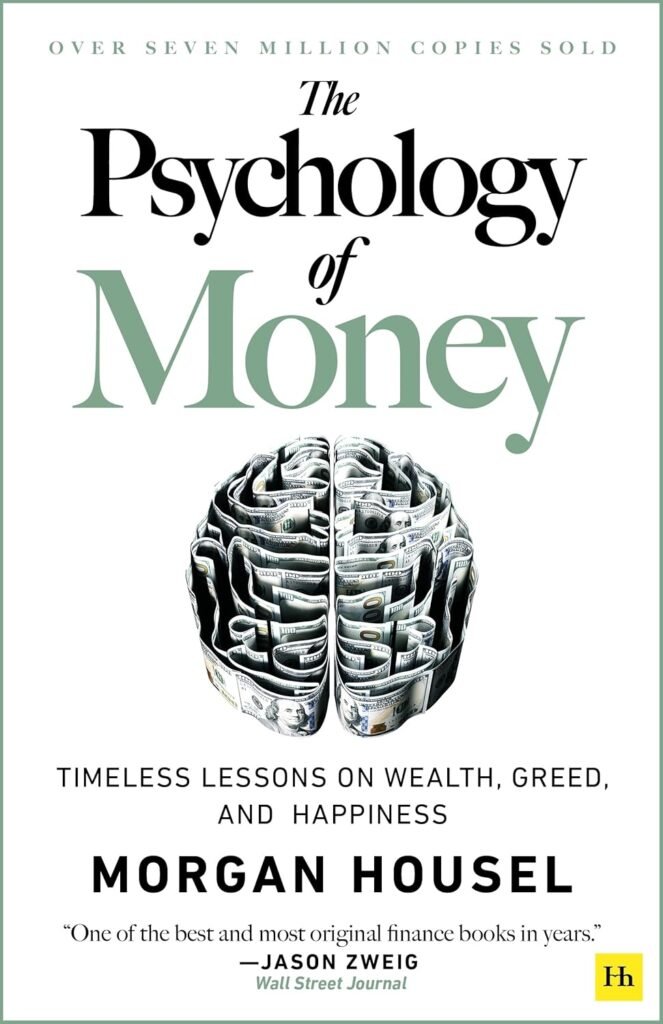Money is weird. We all want more of it, but most of us don’t even know why. Some people think money is just about numbers—like if you budget hard enough, suddenly you’ll unlock financial enlightenment. But The Psychology of Money by Morgan Housel makes one thing clear: money isn’t about math. It’s about mindset.
Think about it—two people can earn the same salary, but one ends up financially secure, and the other is drowning in Uber Eats debt. Why? Because money decisions aren’t logical. They’re emotional. And that’s exactly why understanding the psychology behind money is way more important than memorizing how compound interest works (even though, yeah, that’s important too).
The way you handle money isn’t about intelligence. It’s about behavior. And behavior, unlike intelligence, is something you can change.
Let’s get into it.
Lesson 1: Money Is Just a Game of Perspective
Imagine two people making $100,000 a year. One lives in a three-bedroom house, drives a Honda, and saves like a responsible adult. The other leases a Tesla, maxes out their credit cards, and acts like Jeff Bezos when splitting the bill. Same income, but their bank accounts tell two very different stories.
That’s because money isn’t just about what you make. It’s about how you think about what you make.
Morgan Housel calls this the behavioral gap. Translation: the way you feel about money changes how you use money. If you think money is just for flexing, you’ll spend it like a lottery winner on a shopping spree. If you think money is for security, you’ll actually keep some of it.
Here’s where it gets interesting: your perspective on money is shaped by your experiences, not by facts. Someone who grew up during a recession might save aggressively, fearing the worst. Someone who only lived through economic booms might be more comfortable taking financial risks. Neither is necessarily right or wrong—just different.
This explains why people argue about money all the time. One person says, “You should invest in stocks.” Another says, “No, stocks are risky, real estate is better.” Another person swears by crypto. And they all think they’re right—because they’re all shaped by different experiences.
But here’s the real question: have you ever actually stopped to think about why you spend, save, or invest the way you do? Because if you haven’t, you’re probably just following financial habits you picked up without questioning them.
Most people don’t go broke because they don’t have enough money. They go broke because they never decide what enough actually looks like. If you don’t define your own “enough,” you’ll always want more. And more. And more.
Lesson 2: Greed Is Just FOMO in a Suit
Greed isn’t just about wanting to be rich. It’s about never feeling like you have enough—even when you do.
That’s why so many lottery winners end up broke. They don’t just spend big—they keep spending big because their brains never hit the brakes. The same thing happens with people chasing the stock market, crypto, or whatever new investment trend is promising “easy” money. They see other people getting rich and think, “I should be making more.” And then they make dumb decisions.
And it’s not just individuals. Companies do this too. Ever heard of a business that was insanely profitable but still went bankrupt? That’s greed at work. They wanted more, expanded too fast, took unnecessary risks, and then collapsed under their own ambition.

Greed isn’t just about money. It’s about comparison. You might be happy with your salary—until you find out your co-worker, who does the same job, makes 10% more. Suddenly, you feel underpaid. Nothing changed except your awareness, but now you feel like you deserve more.
That’s why defining your own success is so important. If you base your financial happiness on what other people have, you’ll never feel satisfied. There will always be someone richer. Someone with a nicer car. Someone with a bigger house. The goalpost never stops moving—unless you decide to stop chasing it.
Warren Buffett—arguably one of the richest and smartest investors alive—still lives in the same house he bought in the 1950s. Why? Because he figured out something most people don’t: more money doesn’t mean more happiness.
The real flex isn’t having more. It’s knowing when you have enough.
Lesson 3: Rich vs. Wealthy—They’re Not the Same Thing
You ever see someone driving a Lamborghini and think, “Wow, that guy must be rich”? Maybe. But also, maybe he’s drowning in car payments and eating ramen noodles for dinner.
Being rich means having a lot of money right now. Being wealthy means having money that stays.
The biggest difference? Rich people spend. Wealthy people save and invest.

One of the wildest things from The Psychology of Money is how quiet real wealth is. The people who actually have money aren’t flexing it 24/7. They don’t need to. You don’t see Bill Gates walking around in Gucci slides. But the guy posting his “rich lifestyle” on Instagram? Yeah, he’s probably one bad month away from selling his car.
Another way to think about it: being rich is like sprinting. Being wealthy is like running a marathon. One burns out quickly, the other lasts a lifetime.
So, if your goal is to be rich for a little while, go ahead—spend recklessly. But if you want to be wealthy, start thinking long-term.
Lesson 4: Money Can’t Buy Happiness, But It Can Buy Options
You’ve heard it a million times: “Money can’t buy happiness.” And sure, technically, that’s true. But also… kind of false.
Studies show that money does increase happiness—up to a certain point (around $75,000 a year, to be exact). After that, more money doesn’t necessarily make you happier. But you know what money does buy? Freedom.
Freedom to:
- Quit a job you hate.
- Take time off when you need it.
- Say “no” to things that stress you out.
- Take care of family without financial stress.
- Not panic every time your car makes a weird noise.
Basically, the goal isn’t just to have money. It’s to have control over your own life. And that’s something worth working for.
The Takeaway: Mastering the Psychology of Money
Look, money isn’t about who’s the smartest or who has the best spreadsheet. It’s about behavior.
Here’s what The Psychology of Money teaches us:
- Money is emotional, not logical.
- Greed will trick you into thinking you need more when you don’t.
- Wealth isn’t about what you spend—it’s about what you keep.
- The goal isn’t to be rich. It’s to have control over your time and choices.
Most people spend their whole lives chasing money without understanding how they actually think about it. Don’t be most people. Get smart. Learn the game. And play it on your own terms.
Want to Take Control of Your Money?
If you’re tired of feeling like money controls you instead of the other way around, it’s time to change that. The first step? Understanding how money really works—not just in your wallet, but in your mind.
Morgan Housel’s The Psychology of Money breaks down the habits, mindsets, and hidden traps that make or break financial success. It’s not about complicated formulas or boring financial jargon—it’s about the real reasons why people win (or lose) with money.
Stop guessing. Start getting smarter about money. Grab your copy of The Psychology of Money now!


